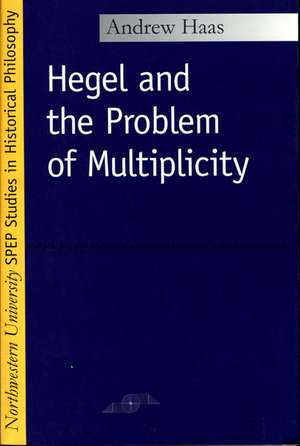Hegel and the Problem of Multiplicity: Studies in Phenomenology and Existential Philosophy
Autor Andrew Haasen Limba Engleză Paperback – 25 ian 2000
At the center of Hegel and the Problem of Multiplicity is the question: what could the term "multiplicity" mean for philosophy? Andrew Haas contends that most contemporary philosophical understandings of multiplicity are either Aristotelian or Kantian and that these approaches have solidified into a philosophy guided by categories of identity and different—categories to which multiplicity as such cannot be reduced. The Hegelian conception of multiplicity, Haas suggests, is opposed to both categories—or, in fact, supersedes them. To come to terms with this critique, Haas undertakes a rigorous, technical analysis of Hegel's Science of Logic. The result is a reading of the concept of multiplicity as multiple, that is, as multiplicities.
Din seria Studies in Phenomenology and Existential Philosophy
-
 Preț: 181.76 lei
Preț: 181.76 lei -
 Preț: 194.88 lei
Preț: 194.88 lei -
 Preț: 329.98 lei
Preț: 329.98 lei -
 Preț: 255.61 lei
Preț: 255.61 lei -
 Preț: 314.27 lei
Preț: 314.27 lei -
 Preț: 255.38 lei
Preț: 255.38 lei -
 Preț: 306.60 lei
Preț: 306.60 lei -
 Preț: 339.71 lei
Preț: 339.71 lei -
 Preț: 272.32 lei
Preț: 272.32 lei -
 Preț: 250.29 lei
Preț: 250.29 lei -
 Preț: 265.88 lei
Preț: 265.88 lei -
 Preț: 221.59 lei
Preț: 221.59 lei -
 Preț: 215.68 lei
Preț: 215.68 lei -
 Preț: 275.22 lei
Preț: 275.22 lei -
 Preț: 245.79 lei
Preț: 245.79 lei -
 Preț: 269.44 lei
Preț: 269.44 lei -
 Preț: 215.68 lei
Preț: 215.68 lei -
 Preț: 240.26 lei
Preț: 240.26 lei -
 Preț: 235.17 lei
Preț: 235.17 lei -
 Preț: 215.94 lei
Preț: 215.94 lei -
 Preț: 248.05 lei
Preț: 248.05 lei -
 Preț: 226.89 lei
Preț: 226.89 lei -
 Preț: 137.25 lei
Preț: 137.25 lei -
 Preț: 240.01 lei
Preț: 240.01 lei -
 Preț: 165.56 lei
Preț: 165.56 lei -
 Preț: 242.69 lei
Preț: 242.69 lei - 18%
 Preț: 698.04 lei
Preț: 698.04 lei -
 Preț: 195.68 lei
Preț: 195.68 lei -
 Preț: 267.53 lei
Preț: 267.53 lei -
 Preț: 223.63 lei
Preț: 223.63 lei -
 Preț: 220.74 lei
Preț: 220.74 lei -
 Preț: 314.03 lei
Preț: 314.03 lei - 21%
 Preț: 480.24 lei
Preț: 480.24 lei - 11%
 Preț: 274.46 lei
Preț: 274.46 lei - 11%
 Preț: 214.35 lei
Preț: 214.35 lei - 10%
 Preț: 232.06 lei
Preț: 232.06 lei - 11%
 Preț: 229.67 lei
Preț: 229.67 lei - 6%
 Preț: 331.75 lei
Preț: 331.75 lei - 36%
 Preț: 165.14 lei
Preț: 165.14 lei -
 Preț: 139.02 lei
Preț: 139.02 lei - 11%
 Preț: 228.57 lei
Preț: 228.57 lei - 12%
 Preț: 204.99 lei
Preț: 204.99 lei - 13%
 Preț: 252.48 lei
Preț: 252.48 lei - 13%
 Preț: 251.36 lei
Preț: 251.36 lei - 23%
 Preț: 588.68 lei
Preț: 588.68 lei
Preț: 270.43 lei
Preț vechi: 307.28 lei
-12% Nou
Puncte Express: 406
Preț estimativ în valută:
51.75€ • 54.17$ • 42.82£
51.75€ • 54.17$ • 42.82£
Carte indisponibilă temporar
Doresc să fiu notificat când acest titlu va fi disponibil:
Se trimite...
Preluare comenzi: 021 569.72.76
Specificații
ISBN-13: 9780810116702
ISBN-10: 0810116707
Pagini: 355
Dimensiuni: 152 x 229 x 25 mm
Greutate: 0.54 kg
Ediția:1
Editura: Northwestern University Press
Colecția Northwestern University Press
Seria Studies in Phenomenology and Existential Philosophy
ISBN-10: 0810116707
Pagini: 355
Dimensiuni: 152 x 229 x 25 mm
Greutate: 0.54 kg
Ediția:1
Editura: Northwestern University Press
Colecția Northwestern University Press
Seria Studies in Phenomenology and Existential Philosophy
Notă biografică
ANDREW HAAS teaches Philosophy at the State University of New York at Stony Brook, USA.
Cuprins
Abbreviations
Preface
Introduction
1. Interrogation of Metaphysics
2. Difference of Absolute Particularity
3. From Science to Speculation
4. Being Multiple
5. Quality of Quantity
6. Measure of Multiplicity
7. Conceptual Subjectivity
8. Conceptual Objectivity
9. Idea of Totality
10. Metaphysics of Multiplicity
Conclusion
Notes
Selected Bibliography
Index
Preface
Introduction
1. Interrogation of Metaphysics
2. Difference of Absolute Particularity
3. From Science to Speculation
4. Being Multiple
5. Quality of Quantity
6. Measure of Multiplicity
7. Conceptual Subjectivity
8. Conceptual Objectivity
9. Idea of Totality
10. Metaphysics of Multiplicity
Conclusion
Notes
Selected Bibliography
Index
Descriere
At the center of Hegel and the Problem of Multiplicity is the question: what could the term "multiplicity" mean for philosophy? Andrew Haas contends that most contemporary philosophical understandings of multiplicity are either Aristotelian or Kantian and that these approaches have solidified into a philosophy guided by categories of identity and different—categories to which multiplicity as such cannot be reduced. The Hegelian conception of multiplicity, Haas suggests, is opposed to both categories—or, in fact, supersedes them. To come to terms with this critique, Haas undertakes a rigorous, technical analysis of Hegel's Science of Logic. The result is a reading of the concept of multiplicity as multiple, that is, as multiplicities.
